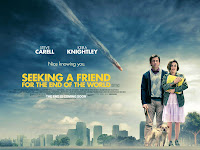Dawn Reader

from Open Door Coffee Co.; Hudson, OH; Oct. 26, 2016
Wednesday, September 5, 2012
Hope Springs and Life's Winters
I don't want to get too far away from my thoughts about seeing the recent film Hope Springs (Meryl Streep and Tommie Lee Jones struggling with a long marriage enmired in routine). We saw it last weekend, but if I wait much longer, my short-term memory (which is miniskirt-short these days) will decide I don't need to remember any of it, and it will melt away like a snowball in Satan's hand. (Not bad, eh?)
First of all--it's not a great film. Not at all. It's more or less an infomercial for self-help books (and their authors) and for marriage counseling, the sort of counseling that sends the patients (clients? what?) off after each session to "practice" doing things--e.g., holding each other in bed. I've not experienced marriage counseling, and I do not in any way want to offend people who have found help there--or who practice the counseling profession (some of my best friends ...)--but I do want to suggest that the script of Hope Springs made it all look kind of simple-minded.
The principal actors were fantastic--though I was a bit worried about the casting of Steve Carrell as the counselor. I kept waiting for him to break into the behavior of one of those wacky characters I know from his other films (The 40-Year Old Virgin, say). He can play straight--I actually admired him in his other recent film, Seeking a Friend for the End of the World, a film I liked a lot. He conveyed an essential wry sadness--but also allowed, now and then, that Carrellian playfulness to emerge. But that film was not popular, not around here anyhow. (It has a dark premise (see title) and dark ending (see title).) The night we saw it, there were only two other people in the theater.
But in Hope Springs, Carrell was totally straight--and perhaps this is why he went for the role. Stephen King wants to write serious novels; J. K. Rowling wants to write for adults; Chris Rock wants to play straight parts; Paul McCartney wants to write for a symphony orchestra; R. L. Stine tried an adult book; William F. Buckley, Jr. wrote a children's book; you see the pattern.
Anyway, here's what I really wanted to get into: I went to the film expecting the worst. As I wrote a week or so ago, there are three large constituencies whom comedians and writers and filmmakers still see as fair targets in comedy: overweight people, stupid people. And old people. (I wrote about the first one not long ago.)
Think of how we picture the old in our films. Remember the grandmother at the table of the famous (?) dinner scene in Wedding Crashers? She said outrageous and raunchy things like Eleanor Roosevelt was a big bull dyke. And think of just about any part Betty White has played in recent years--I'm thinking of her in The Proposal. And think of the countless "dirty old men" who have populated films in recent years. The filmmakers seem to be thinking: Old folks are just like the rest of us; they like dirty talk and sex. But with them it's gross and funny because, you know, they're old! Not often do we see an older adult who has a brain in his head (Karate Kid comes to mind as an exception). Usually, older characters are bigoted, stupid, forgetful, gross (they want sex! yuck!). And how many Viagra/Cialis jokes are there? (And is it a coincidence that Viagra rhymes with Niagara?)
(Shakespeare wasn't above it, that's for sure. Think, for example, of Gremio, the old fool who's pursuing the young Bianca in The Taming of the Shrew.)
I remember an episode from Sex and the City. Samantha decides she will settle down with a much older man. (He's rich--and, she thinks, if they keep the lights off during sex, well, sex is sex, you know?) It all seems to be going okay until one night when he gets up to go to the bathroom. He turns on a light, and we get a look at his naked body moving away from the bed--in the light. He was withered and old. He actually resembled a frog walking upright. Samantha was grossed out, and while he was in the bathroom, she bolted. So much for that idea. (I just discovered: It's on YouTube! (Link))
So, I was expecting the worst in Hope Springs--more parodies of the older adult, more sex between old people is gross. (That notion, BTW, is born, I think, when it first dawns on us that our parents had sexual relations ... YUCK!)
But I was surprised--happily so. Both Jones and Streep worked hard to bring dignity to their characters--and to show us that physical intimacy between older lovers can be every bit as moving (and uncomfortable and funny) as it is between younger ones. I can't speak to the yuck factor because there were no teens or other young folks in the audience. I'm guessing that during a couple of the make-out scenes, I would have heard that involuntary sound from them, the one that is hard to spell but rhymes with ewe--only more drawn out with a falling inflection. I used to hear it in class now and then when, feeling frisky, I would say something ... inappropriate.
And I'll end with a final scene. One of the last memories I have of my maternal grandparents (he died in 1965, she in 1978) was when I was in high school. They were visiting. Sitting on our couch. He had his arm around her. Her head was on his shoulder. He reached across his body with his other hand to hold hers. I thought it was surprising. But I was wrong. It was a miracle. The one we've named Love.
Subscribe to:
Post Comments (Atom)



No comments:
Post a Comment